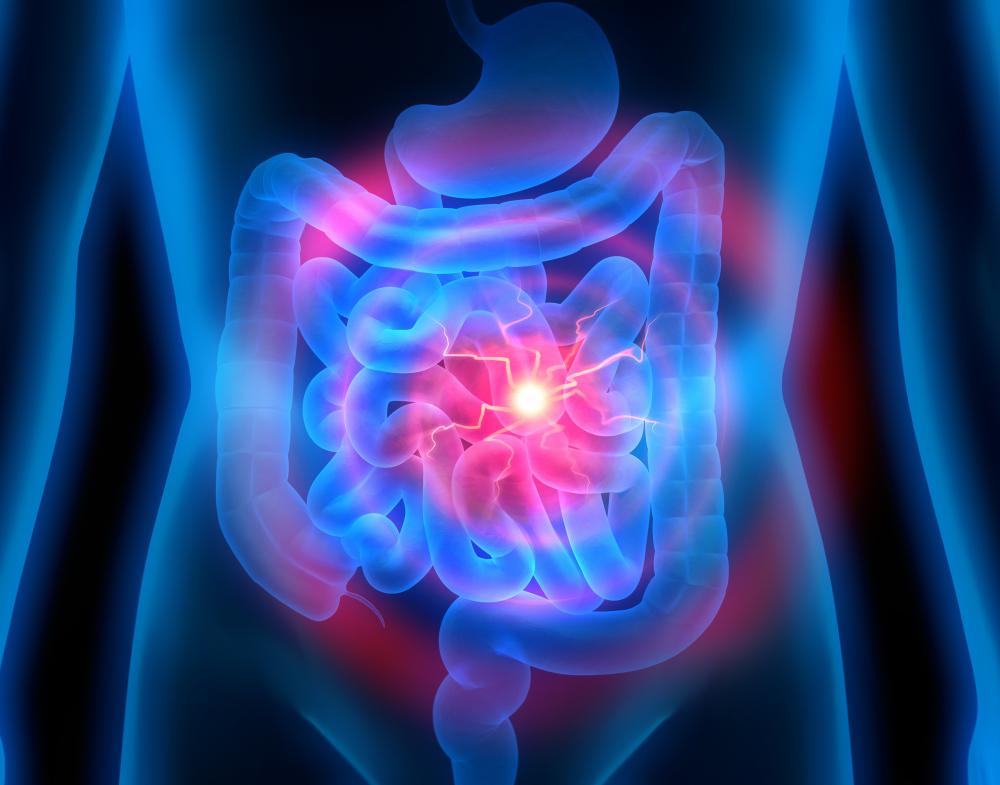At WiseGEEK, we're committed to delivering accurate, trustworthy information. Our expert-authored content is rigorously fact-checked and sourced from credible authorities. Discover how we uphold the highest standards in providing you with reliable knowledge.
What Causes Dyspepsia?
Dyspepsia, also known as indigestion, is a medical condition affecting the intestines. Using the two terms interchangeably is not always accurate, as dyspepsia tends to be longer lasting. It typically affects the stomach and the small intestine first. Common symptoms include belching, abdominal pain, abdominal bloating, nausea, and a feeling of being full, and some individuals also experience a burning or gnawing feeling in their stomachs. These symptoms are typically triggered by eating.
A variety of conditions can cause dyspepsia, including diseases such as hyperparathyroidism, which results from an overactive parathyroid gland. Others, such as thyroid disease, diabetes, and severe kidney disease, are also potential causes. Researchers are still unsure why these diseases, which are not directly related to the gastrointestinal system, cause dyspepsia.

Acid reflux disease and stomach ulcers can also cause dyspepsia. When a person suffers from acid reflux disease, his or her stomach acid enters into the esophagus and causes pain in the chest. Over time, this build up of stomach acids can lead to stomach problems. On rare occasions, the condition may also be caused by stomach cancer.
Drugs can also cause dyspepsia. The type of drugs most frequently associated with this condition are anti-inflammatory drugs such as ibuprofen, estrogen, and antibiotics. Most drugs, however, cause stomach problems in at least a small portion of users.

The majority of dyspepsia cases are believed to be caused by a dysfunction of the organs within the gastrointestinal tract or by the nerves that control these organs. Since the nerves involved with the gastrointestinal tract go to the brain and run inside the spinal cord, the dysfunction causing the problems may also be within one of those locations as well.

Individuals with a dysfunctional gastrointestinal system are more prone to developing dyspepsia. For these people, certain conditions, including depression and anxiety, can increase their likelihood of exhibiting symptoms. A woman’s menstrual cycle also tends to exacerbate dyspepsia, as it increases the amount of progesterone and estrogen in her body. Research has demonstrated that blocking these hormones reduces the likelihood of developing stomach problems.

In most cases, dyspepsia is not a serious condition, though it can be quite uncomfortable. Anyone suffering from it who is over the age of 50 or who has lost weight without trying to should see a healthcare professional. Other symptoms of concern include difficulty swallowing, severe vomiting, and black or bloody bowel movements.
AS FEATURED ON:
AS FEATURED ON:















Discussion Comments
@StarJo – I used to experience the same dyspepsia symptoms. Making just a few small changes made a big difference, and now, I rarely have intestinal discomfort.
I figured that since I felt full so soon after beginning to eat, maybe my body was telling me that I was putting too much food in at one time. I started cutting my portions down, and I would eat a small mid-morning and mid-afternoon snack to make up for the lost food. This enabled me to get the nutrients I needed without the pain.
Also, I used to eat a lot of spicy Mexican food. I gave it all up, because it seemed that my symptoms worsened after eating salsa or fajitas.
I've been using over-the-counter medicine to reduce my trapped gas, and this helps temporarily. However, I'm looking for a more long-term dyspepsia treatment.
I've already tried eliminating stress from my life, but that just isn't entirely possible. I've done what I can, but I know there must be certain physical things that I can do to prevent the symptoms from happening so often.
I rarely eat everything on my plate, because my stomach just feels full before I get done. I can actually feel the gas inside my abdomen growing as I eat, and I have to stop too soon.
Does anyone have any suggestions? I'm open to changing the way I eat, if that's what it takes.
I have severe dyspepsia during my menstrual cycle. The second day of it is the worst, because that is when my flow is heaviest.
I feel so bloated that I can't even button my pants, so I have to wear skirts with elastic waists during this week. I sometimes feel so nauseous that I have to go home from work, and at times, I also have abdominal pain.
One thing that I have noticed about this time of the month is that I always feel as if my bowels are full and need to move, even when they aren't. This is a very uncomfortable sensation, and I believe it is just one more symptom of dyspepsia.
I think that anxiety was the cause of my dyspepsia. I had a terrible time with it while working at a very stressful job. The load that was placed upon me each day only furthered the dyspepsia, and no amount of medication could soothe my intestines.
I figured that it was stress-related, but I didn't know for sure until I took a two-week vacation. About three days into the first week, all my symptoms were gone. I felt better than I had in months, and I knew what I had to do.
I gave my notice once I returned, and I've been working from home ever since. I no longer have the painful bloating and gas, and my appetite has returned in full force.
It seems like there are a lot of possible dyspepsia causes! It must be kind of difficult for doctors to get to the root of the problem in a patient that has the symptoms of dyspepsia. After all, it could be caused by medicine, other health conditions that have nothing to do with the digestive system, or cancer!
I have a friend who was taking prescription anti-inflammatory medicine for pain. She ended up developing dyspepsia because of the medication. Her doctor figured out the cause right away though, because the symptoms started very soon after she started the medication.
Post your comments